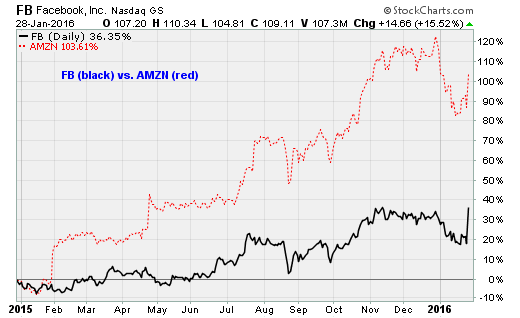Amazon vs. Facebook: Which tech stock is best?
If 2015 had an investment theme (besides avoiding anything energy-related), it was focusing on the tech momentum favorites dubbed the "FANGs." Those were Facebook (FB), Amazon (AMZN), Netflix (NFLX) and Google (GOOG), which is now a part of the umbrella company called Alphabet.
As the broad market worked into an epic rounding pattern (a set of incremental new highs into a top before rolling over) that started in late 2014, the FANGs just kept powering higher. While large-caps finished last year with a loss, Facebook gained roughly 25 percent, Amazon and Netflix more than doubled, and Google gained nearly 50 percent.
This week, Amazon and Facebook, which are focusing on much different growth initiatives for the future, both reported earnings with vastly different results. Amazon wants to be all about the Internet of Things, cloud computing and drone deliveries. Facebook about consumer virtual reality, human-augmented digital assistants and ubiquitous Internet access.
The question is: Which one will be the best to own going forward?
First, let's talk earnings.
After the close on Thursday, Amazon reported an earnings miss, posting $1 a share vs. the $1.61 that was expected. That sent its shares down more than 13 percent in extended trading. Revenues missed as well at $35.7 billion vs. the $35.9 billion expected. Forward guidance was also weak, with first-quarter operating income expected to be between $100 million and $700 million.
After a couple quarters of surprising profitability, the online retail giant is once again hamstrung by worries that its exponential growth isn't delivering the promised earnings power.
Facebook shares, on the other hand, surged 7.5 percent in after-hours trading on Wednesday after the company reported a top- and bottom-line beat, with earnings of 79 cents per share vs. the 68 cents expected. User growth was very strong, with monthly active users at 1.59 billion (up 14 percent from last year), daily active users at 1.04 billion (up 17 percent) and mobile daily users at 934 million (up 25 percent). Advertising revenue increased 57 percent from last year to $5.6 billion.
To be fair, Facebook's share price performance has a long way to go before closing the gap with Amazon's impressive run last year (chart above). Nor is it clear that Amazon's disappointment on Thursday will be enough to break the powerful uptrend the stock has enjoyed over the past year.
All this will depend on the relative success of each company's effort to evolve from online retailer and social network into something more.
Despite flops like the Fire Phone, with its overhyped but underwhelming "3D screen" feature, Amazon is laying the groundwork for continued success as it keeps evolving.
The next step is harnessing its cloud-based computing infrastructure to become the dominant platform for the Internet of Things, or "IoT" -- the buzzword for smart, connected everyday devices. And among the many companies fighting to become the IoT's ecosystem provider -- as Microsoft (MSFT) did for PCs and Apple (AAPL) did for mobile computing -- Amazon has a head start, thanks to its proven and inexpensive Amazon Web Services offering.
Back in October, Amazon announced a partnership initiative to create an IoT platform with relevant supply-chain, hardware and semiconductor companies giving them access to cloud-based AWS processing horsepower. Companies in the partnership include Broadcom (BRCM), Intel (INTC), Marvell (MRVL), Qualcomm (QCOM) and Texas Instruments (TXN), among others.
Amazon's existing in-house experiments with IoT are well known, such as the "Dash Button" that automatically reorders your baby food or paper towels at a press.
Facebook's long-term focus is on incremental gains from global advertising revenue, monetizing video content and other efforts. Wedbush analyst Michael Pachter is most encouraged by the efforts to expand the company's other social media platforms such as Instagram (with 400 million monthly active users), WhatsApp and Messenger. The Facebook M assistant fits into this as category as well because it encourages the use of the Messenger app.
Other initiatives include the coming launch of the Oculus VR headset which will, at least initially, focus primarily on video gamers. Priced at $599, the headset is open for preorders ahead of its release in July. An expensive toy for early adopters, the technology holds promise for its potential to change the way Facebook users interact.
As for the final verdict: I'll leave it up to readers to decide. Which company do you think is plotting the best future?

